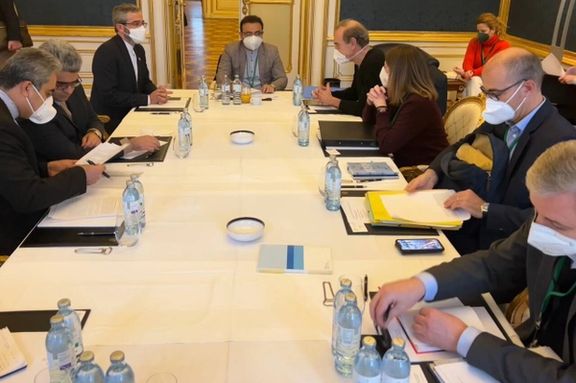Europe Mulls Next Iran Nuclear Moves, US Evokes ‘Other Options’

France’s foreign affairs spokesperson said Thursday Paris was “extremely concerned” at Iran’s lack of co-operation with the United Nations nuclear watchdog.

France’s foreign affairs spokesperson said Thursday Paris was “extremely concerned” at Iran’s lack of co-operation with the United Nations nuclear watchdog.
In Washington the United States national security spokesman John Kirby said President Joe Biden had told officials to make sure that, should efforts to revive the 2015 Iran nuclear deal fail, “we have other available options to us to potentially achieve that solid outcome of no nuclear weapons capability for Iran.”
While Kirby was reiterating existing policy, and did not elaborate what these options might be, the French foreign ministry spokesperson Anne-Claire Legendre concentrated on what may be an issue at the September 12-16 board meeting of the International Atomic Energy Agency (IAEA).
Legendre said France was consulting with “partners” on how to proceed after an IAEA report circulated Wednesday said there had been no progress in discussions with Tehran since agency director-general Rafael Mariano Grossi in June reported as inadequate explanations given by Tehran over uranium traces found by inspectors.
Iran had not “seized the opportunities” offered by the IAEA to “engage and shed light on the presence of non-declared nuclear materials at non-declared sites,” Legendre said. Following Grossi’s June report, France joined Germany, the United Kingdom, and the US in successfully moving a resolution at the IAEA board censuring Iran.
Whatever the “other options” raised by Kirby, the US and the three European states, the ‘E3’ may opt to tread lightly at the board so as not to scupper remaining hopes for reviving the 2015 nuclear deal, the JCPOA (Joint Comprehensive Plan of Action).

While the E3 and US insist that the uranium traces are unrelated to JCPOA revival and instead a basic Iranian commitment under the Nuclear Non-Proliferation Treaty, Tehran has repeatedly said the IAEA enquiry into the uranium, which relates to work before 2003, must be dropped before the JCPOA is revived
Will the IAEA board escalate?
The US and E3 may not want to escalate matters at the IAEA board by referring Iran to the United Nations Security Council (UNSC), as happened in 2005 when the UNSC went on to impose multilateral sanctions. Russia and China voted against the June resolution at the IAEA board on grounds it undermined diplomacy over JCPOA revival, and both hold UNSC vetoes.
Russia’s IAEA ambassador, Mikhail Ulyanov, this week said another board resolution would be “extremely counterproductive.” As the E3 has edged closer to the Biden administration, Russia and China have maintained that an onus in the talks lies on the US, whose previous president Donald Trump left the JCPOA in 2018 and imposed ‘maximum pressure’ sanctions on Iran.
While analysts increasingly believe that the JCPOA talks are on hold until the November 8 US Congressional elections, Iran’s nuclear program continues to expand. The IAEA’s latest quarterly report showed Tehran’s stocks of highly enriched uranium of 60 percent purity at 55.6 kg, and its overall uranium stockpile at 3,941 kg. Under the JCPOA, Iran is allowed to enrich only to 3.67 percent and to hold 300 kg. Tehran has also recently brought into use more advanced centrifuges banned under the JCPOA.
Malley briefing Congress 14
Both supporters and opponents of the JCPOA in the US say this expansion confirms their views. Rob Malley, the White House special Iran envoy who is due to give a confidential briefing to the House of Representatives Foreign Affairs committee September 14, has argued both that agreement is close and that restoring the JCPOA is the most effective way to curb Iran’s nuclear program.
Critics of the agreement point to reported concessions offered by Washington that would ease the JCPOA’s nuclear restrictions, and they bemoan the billions in frozen overseas assets Iran would regain with the easing of ‘maximum pressure.’ Senator Tommy Tuberville, a Republican, this week criticized efforts to revive the agreement as motivated by a desire to “get Iranian oil to Europe.”